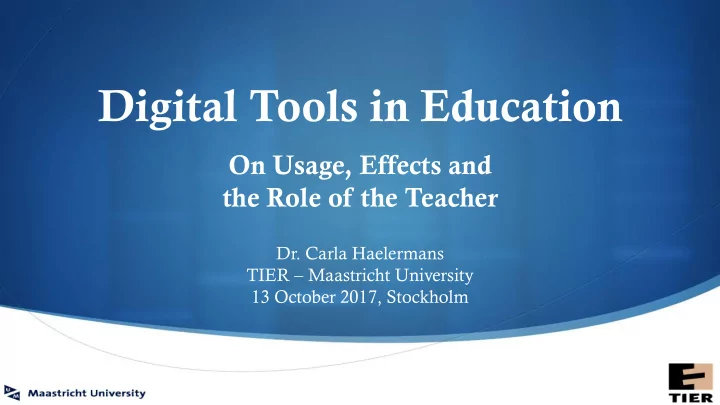

Digital Tools in Education On Usage, Effects and the Role of the Teacher Dr. Carla Haelermans TIER – Maastricht University 13 October 2017, Stockholm
Why this study? How to achieve highest possible student performance? What role can Information and Communications Technology (ICT) play?
Research Questions
What is ICT in education? ICT in education generally refers to everything that involves technology in education: Devices Computers, tablets, smart phones, interactive whiteboards Software Educational games, digital learning tools, other applications online
ICT is believed to Make life-long-learning easier Contribute to individual enhancement (and increase employability and productivity) Enhance digital competence Complement and facilitate in teaching process Help with individual differentiation
ICT in education Some evidence in literature of positive effects Although OECD did not see relation between ICT presence and student performance (PISA 2012) Most schools have access to ICT So why no relation with student performance?
Effective use of ICT ICT use needs to be effective (it is a tool, not a goal): Clear pedagogical/didactical focus Knowledge on ICT (know benefits + how to use it) Common support Facilitation of schools, managers and teachers For training and usage
Aim of this report To contribute to the debate on which types of ICT use in education have proven to be effective Earlier international research Dutch experiments Bring research and practice closer together Applicability of findings and recommendations
Conclusions from earlier research
Conclusions from earlier research General investments (no specific purpose) mixed results, at best. (Small) positive effects of computer assisted instruction vs. traditional classroom learning Positive effects of specific digital learning tools In developing countries For mathematics But not for language training (mother tongue)
Conclusions earlier research Effectiveness of ICT in education highly dependent on how it is used and which (pedagogical) purpose it is intended to serve Cost-effectiveness is rarely studied Barriers to technological change Internal beliefs, Lack of time, knowledge or training
Conclusions from Dutch experiments 12
Experiments in the Netherlands 8 different randomized experiments on ICT in secondary education in the Netherlands between 2012 and 2015
Conclusions from Dutch experiments Digital adaptive practice tools: Positive effects for mathematics and some aspects of language Individualization is effective
Conclusions from Dutch experiments Most effective for instructions that are easy to automate Effects differ across domains Effects differ across performance levels
Conclusions from Dutch experiments Other types of ICT: In-class-level differentiation through use of hardware is effective Digital tests are effective Digital feedback is effective
Conclusions from Dutch experiments Overall: Effects are often dependent on the teacher Parental involvement is important
Conclusions from Dutch experiments Effectiveness of ICT in education depends on how it is used and the pedagogical purpose of the digital tool!
Recommendations 19
Recommendations school level Deliberate choice and introduction of ICT tools Continuous training for professional development Bottom-up approach
Recommendations national level More evidence about effects of digital tools National knowledge system/infrastructure Disseminate knowledge on how to use ICT (devices) Communication of research results Stimulate research and provide guidance on effective use Integrating ICT in teacher education and in educational plans
Recommendations general level Focus on effective practice Do not underestimate the role of the human factor
Thank you for your attention! Questions? 23
Recommend
More recommend